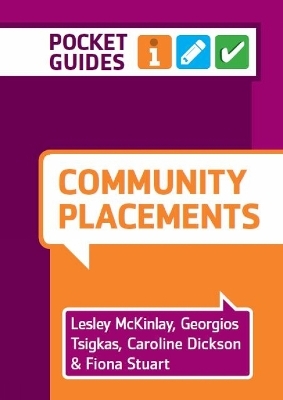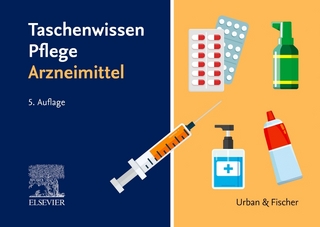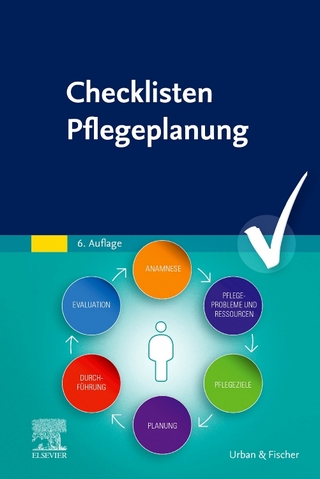
Community Placements
Lantern Publishing Ltd (Verlag)
978-1-908625-55-7 (ISBN)
Community placements can be daunting to the unprepared. This pocket guide will make placements more enjoyable and less stressful, so that you get the most out of your time in the community.
A handy, pocket-sized guide designed to help student nurses make the most of their community nursing placements.
Community placements can be daunting – you’ll be working in a variety of settings, caring for a range of individual people and families with different needs, often in their own homes. There are new colleagues to work with, and newly learned nursing theory to put into practice. This pocket guide is designed to make your placements much more enjoyable and less stressful.
From absence policy to palliative care, via home visiting, it’s full of practical detail, hints and tips.
Written by experienced lecturers with the input of current nursing students – this guidance is really produced with you in
mind.
Pocket-sized format – carry it with you at all times.
Space to make your own notes – be it uniform policy, observations about the community you’re supporting, or just the names of your new colleagues!
Reduce your stress and make the most of your community placement by having this book to hand from the start.
Pocket Guides is a series of handy, pocket-sized books designed to help students make the most of their practice learning experiences.
Georgios graduated as a Registered General Nurse in Athens, Greece, before moving to Cardiff in 2014 and completing his master’s degree in Advanced Practice Education for Health Professionals. His clinical experience is in acute medical admission wards and emergency departments across Greece and the UK. He is a lecturer in nursing and also a doctoral candidate at Queen Margaret University, Edinburgh. His teaching activities include nursing skills and procedures. Caroline Dickson has been a Registered Nurse since 1985 and has considerable experience within community nursing, particularly district nursing, general practice nursing and practice development. In 2003 she moved into higher education at Queen Margaret University, Edinburgh where she is Senior Lecturer in Community Nursing and Programme Leader for the PGDip Person-centred Practice (District Nursing). She also contributes to the undergraduate nursing programme from a community nursing perspective and is an Honorary District Nurse in NHS Borders and in clinical practice one day per month. Caroline is currently Chair of the RCN District Nursing Forum and a member of the Association of District Nurse Educators. She was a member of the Steering Group that developed the Queen’s Nursing Institute voluntary standards for District Nurse Education and Practice (2016). She also been a member of a variety of national groups developing district and community nursing services in Scotland and the UK. She is a member of the International Practice Development Collaborative. She regularly reviews papers for a number of journals including the British Journal of Community Nursing, International Practice Development Journal, Journal of Nursing Management and the International Journal of Older People, and she has held External Examiner positions in various universities throughout the UK.
Getting there
1. Preparing for community placement
2. Uniform
3. Absence policy
4. Professionalism
4.1 The NMC Code
4.2 Raising concerns
4.3 Consent and confidentiality
4.4 Social media
5. Person-centred practice
Settling there
6. Induction / first day
7. Key colleagues you will be working with
7.1 Health Visitors
7.2 District Nurses
7.3 General Practice Nurses
7.4 School Nurses
8. Getting to know your community
9. Working with your mentor
Being there
10. Home visiting
11. Interpersonal skills
12. Communicating with colleagues
12.1 Nursing handover
12.2 Answering the telephone
13. Health and safety
13.1 Infection control
13.2 Manual handling
13.3 Lone working
14. Community emergencies
14.1 Falls in the community
14.2 Infections and the risk of sepsis
14.3 Basic Life Support (BLS)
14.4 Violence and aggression
15. Documentation
15.1 Incident reporting
15.2 Yellow Card Scheme
16. Caring and supporting people across the lifespan
16.1 Childhood development
16.2 Long-term conditions
16.3 Palliative and end of life care
16.4 Following a death in the community
17. Opportunities for learning
17.1 Practice assessment documentation
Moving on from there
18. Reflection
19. Completion of your practice assessment documentation
20. Transferable skills
21. Further reading
| Erscheinungsdatum | 10.05.2021 |
|---|---|
| Verlagsort | Cheltenham |
| Sprache | englisch |
| Maße | 105 x 148 mm |
| Gewicht | 80 g |
| Themenwelt | Medizin / Pharmazie ► Pflege ► Ausbildung / Prüfung |
| ISBN-10 | 1-908625-55-4 / 1908625554 |
| ISBN-13 | 978-1-908625-55-7 / 9781908625557 |
| Zustand | Neuware |
| Haben Sie eine Frage zum Produkt? |
aus dem Bereich


